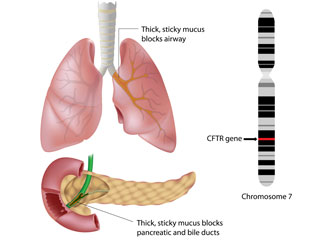What is Cystic Fibrosis?
A common respiratory and digestive disorder

Find out if you are at risk - get tested
| Test Type | Testing Time | Fee |
All orders received before 3pm PST / 6pm EST are shipped out the same business day. All orders received after 3pm PST / 6pm EST or on weekends or holidays are shipped out the following business day. 24/7 online status check and account management available for all tests.
Cystic fibrosis is a disorder characterized by the accumulation of thick, sticky mucus primarily in the lungs and digestive system. This progressive disorder leads to life-threatening lung infections, breathing difficulties and poor digestion.
What Causes Cystic Fibrosis?
Cystic fibrosis is caused by mutations in the CFTR gene. This gene encodes the cystic fibrosis transmembrane conductance regulator, which is required for controlling the movement of salt in the body. Mutations in the CFTR gene affect the cells that produce mucus, sweat and digestive fluids, leading to the production of thick, sticky mucus in the lungs, very salty sweat and thick digestive fluids. These thick secretions accumulate and clog tubes, ducts and passageways in the internal organs. Cystic fibrosis is one of the most common life-threatening genetic disorders and approximately 1 in 25 Caucasians are carriers of a mutated CFTR gene.
Genetics of Cystic Fibrosis
Cystic fibrosis is an autosomal recessive condition caused by a mutation in the CFTR gene. The CFTR gene is located on chromosome seven (one of the autosomal chromosomes). Each person has two copies of each autosomal chromosome (and the genes on each chromosome). Recessive conditions, such as cystic fibrosis, only occur when both copies of the disease-associated gene (e.g. CFTR) carry a genetic mutation. Carriers of recessive conditions have one mutated gene and one normal gene and are unaffected. However, if two parents are carriers of a CFTR mutation, there is a 25% chance that the child will be born with cystic fibrosis. There is also a 50% chance that the child will be a carrier and a 25% chance that the child will have two fully functional copies of the CFTR gene.
Several hundred disease-causing mutations have been identified in the CFTR gene. Although the most common mutations vary between ethnicities, the mutations screened in this cystic fibrosis DNA test (see table below) account for the significant majority of cystic fibrosis cases worldwide. The first nine mutations alone account for approximately 99% of Ashkenazi Jewish cystic fibrosis cases. DeltaF508 is the most common mutation across all ethnicities accounting for approximately 2/3 of all cystic fibrosis cases and over 70% of non-Hispanic Caucasian cystic fibrosis cases.
| Common Name | Nucleotide Change |
|---|---|
| DeltaF508 | c.1521_1523delCTT |
| W1282X | c.3846G>A |
| N1303K | c.3909C>G |
| G542X | c.1624G>T |
| 3849+10kbC>T | c.3717+12191C>T |
| 1717-1G>A | c.1585-1G>A |
| S549R | c.1647T>G |
| G85E | c.254G>A |
| IVS-8 5T/7T/9T | – |
| 1078delT | c.948delT |
| R347H | c.1040G>A |
| R347P | c.1040G>C |
| DeltaI507 | c.1519_1521delATC |
| A455E | c.1364C>A |
| 1898+1G>A | c.1766+1G>A |
| 394delTT | c.262_263delTT |
| R560T | c.1679G>C |
| R334W | c.1000C>T |
| 3199del6 | c.3067_3072delATAGTG |
| 711+1G>T | c.579+1G>T |
| V520F | c.1558G>T |
| 2789+5G>A | c.2657+5G>A |
| 3659delC | c.3528delC |
| R1162X | c.3484C>T |
| R553X | c.1657C>T |
| R117H | c.350G>A |
| 3905insT | c.3773insT |
| 3876delA | c.3744delA |
| 621+1G>T | c.489+1G>T |
| 3120+1G>A | c.2988+1G>A |
| 2184delA | c.2052delA |
| 2183AA>G | c.2051_2052delAAinsG |
| Y122X | c.498T>A |
| Q493X | c.1477C>T |
| 3849+4A>G | – |
| S549N | c.1646G>A |
| G551D | c.1652G>A |
| I506V | c.1516A>G |
| I507V | c.1519A>G |
